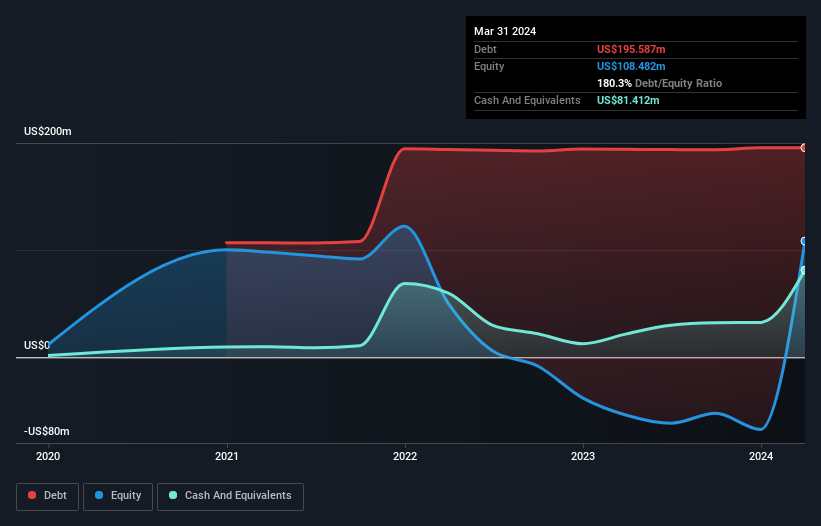The external fund manager backed by Berkshire Hathaway's Charlie Munger, Li Lu, makes no bones about it when he says 'The biggest investment risk is not the volatility of prices, but whether you will suffer a permanent loss of capital.' When we think about how risky a company is, we always like to look at its use of debt, since debt overload can lead to ruin. Importantly, BigBear.ai Holdings, Inc. (NYSE:BBAI) does carry debt. But the more important question is: how much risk is that debt creating?
What Risk Does Debt Bring?
Debt and other liabilities become risky for a business when it cannot easily fulfill those obligations, either with free cash flow or by raising capital at an attractive price. If things get really bad, the lenders can take control of the business. However, a more frequent (but still costly) occurrence is where a company must issue shares at bargain-basement prices, permanently diluting shareholders, just to shore up its balance sheet. Of course, debt can be an important tool in businesses, particularly capital heavy businesses. When we examine debt levels, we first consider both cash and debt levels, together.
Check out our latest analysis for BigBear.ai Holdings
How Much Debt Does BigBear.ai Holdings Carry?
As you can see below, BigBear.ai Holdings had US$195.6m of debt, at March 2024, which is about the same as the year before. You can click the chart for greater detail. However, it does have US$81.4m in cash offsetting this, leading to net debt of about US$114.2m.

How Healthy Is BigBear.ai Holdings' Balance Sheet?
According to the last reported balance sheet, BigBear.ai Holdings had liabilities of US$63.1m due within 12 months, and liabilities of US$206.1m due beyond 12 months. Offsetting these obligations, it had cash of US$81.4m as well as receivables valued at US$39.0m due within 12 months. So its liabilities outweigh the sum of its cash and (near-term) receivables by US$148.8m.
BigBear.ai Holdings has a market capitalization of US$425.7m, so it could very likely raise cash to ameliorate its balance sheet, if the need arose. However, it is still worthwhile taking a close look at its ability to pay off debt. The balance sheet is clearly the area to focus on when you are analysing debt. But ultimately the future profitability of the business will decide if BigBear.ai Holdings can strengthen its balance sheet over time. So if you want to see what the professionals think, you might find this free report on analyst profit forecasts to be interesting.
Over 12 months, BigBear.ai Holdings made a loss at the EBIT level, and saw its revenue drop to US$146m, which is a fall of 9.1%. That's not what we would hope to see.
Caveat Emptor
Importantly, BigBear.ai Holdings had an earnings before interest and tax (EBIT) loss over the last year. To be specific the EBIT loss came in at US$35m. When we look at that and recall the liabilities on its balance sheet, relative to cash, it seems unwise to us for the company to have any debt. So we think its balance sheet is a little strained, though not beyond repair. However, it doesn't help that it burned through US$26m of cash over the last year. So suffice it to say we consider the stock very risky. When analysing debt levels, the balance sheet is the obvious place to start. But ultimately, every company can contain risks that exist outside of the balance sheet. For example BigBear.ai Holdings has 4 warning signs (and 2 which are potentially serious) we think you should know about.
If you're interested in investing in businesses that can grow profits without the burden of debt, then check out this free list of growing businesses that have net cash on the balance sheet.
Valuation is complex, but we're here to simplify it.
Discover if BigBear.ai Holdings might be undervalued or overvalued with our detailed analysis, featuring fair value estimates, potential risks, dividends, insider trades, and its financial condition.
Access Free AnalysisHave feedback on this article? Concerned about the content? Get in touch with us directly. Alternatively, email editorial-team (at) simplywallst.com.
This article by Simply Wall St is general in nature. We provide commentary based on historical data and analyst forecasts only using an unbiased methodology and our articles are not intended to be financial advice. It does not constitute a recommendation to buy or sell any stock, and does not take account of your objectives, or your financial situation. We aim to bring you long-term focused analysis driven by fundamental data. Note that our analysis may not factor in the latest price-sensitive company announcements or qualitative material. Simply Wall St has no position in any stocks mentioned.
About NYSE:BBAI
BigBear.ai Holdings
Provides artificial intelligence-powered decision intelligence solutions.
Flawless balance sheet with low risk.
Market Insights
Community Narratives




